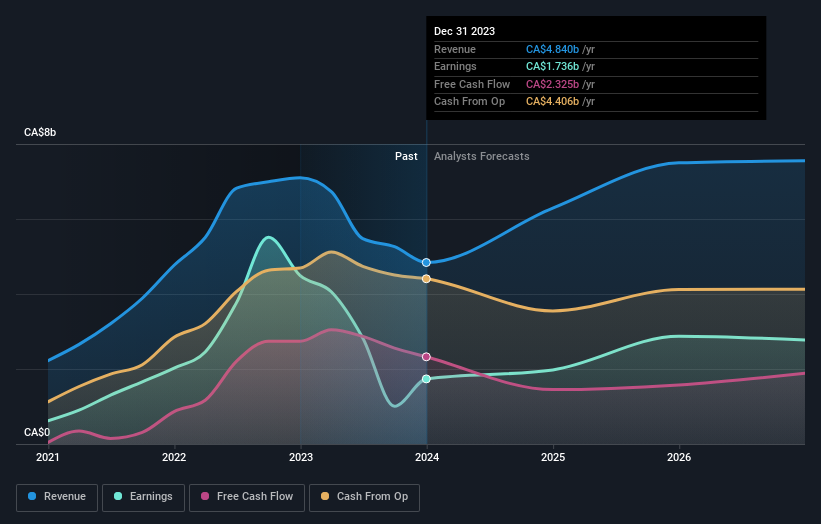Retail investors who have a significant stake must be disappointed along with institutions after Tourmaline Oil Corp.'s (TSE:TOU) market cap dropped by CA$868m
Key Insights
The considerable ownership by retail investors in Tourmaline Oil indicates that they collectively have a greater say in management and business strategy
The top 25 shareholders own 41% of the company
If you want to know who really controls Tourmaline Oil Corp. (TSE:TOU), then you'll have to look at the makeup of its share registry. The group holding the most number of shares in the company, around 52% to be precise, is retail investors. In other words, the group stands to gain the most (or lose the most) from their investment into the company.
While institutions, who own 43% shares weren’t spared from last week’s CA$868m market cap drop, retail investors as a group suffered the maximum losses
Let's take a closer look to see what the different types of shareholders can tell us about Tourmaline Oil.
Check out our latest analysis for Tourmaline Oil
What Does The Institutional Ownership Tell Us About Tourmaline Oil?
Many institutions measure their performance against an index that approximates the local market. So they usually pay more attention to companies that are included in major indices.
Tourmaline Oil already has institutions on the share registry. Indeed, they own a respectable stake in the company. This implies the analysts working for those institutions have looked at the stock and they like it. But just like anyone else, they could be wrong. When multiple institutions own a stock, there's always a risk that they are in a 'crowded trade'. When such a trade goes wrong, multiple parties may compete to sell stock fast. This risk is higher in a company without a history of growth. You can see Tourmaline Oil's historic earnings and revenue below, but keep in mind there's always more to the story.
We note that hedge funds don't have a meaningful investment in Tourmaline Oil. Our data shows that Capital Research and Management Company is the largest shareholder with 13% of shares outstanding. Meanwhile, the second and third largest shareholders, hold 4.4% and 3.1%, of the shares outstanding, respectively. Michael Rose, who is the second-largest shareholder, also happens to hold the title of Chief Executive Officer.
A deeper look at our ownership data shows that the top 25 shareholders collectively hold less than half of the register, suggesting a large group of small holders where no single shareholder has a majority.
While studying institutional ownership for a company can add value to your research, it is also a good practice to research analyst recommendations to get a deeper understand of a stock's expected performance. Quite a few analysts cover the stock, so you could look into forecast growth quite easily.
Insider Ownership Of Tourmaline Oil
The definition of company insiders can be subjective and does vary between jurisdictions. Our data reflects individual insiders, capturing board members at the very least. Company management run the business, but the CEO will answer to the board, even if he or she is a member of it.
Insider ownership is positive when it signals leadership are thinking like the true owners of the company. However, high insider ownership can also give immense power to a small group within the company. This can be negative in some circumstances.
Shareholders would probably be interested to learn that insiders own shares in Tourmaline Oil Corp.. It is a very large company, and board members collectively own CA$1.2b worth of shares (at current prices). we sometimes take an interest in whether they have been buying or selling.
General Public Ownership
The general public, mostly comprising of individual investors, collectively holds 52% of Tourmaline Oil shares. This level of ownership gives investors from the wider public some power to sway key policy decisions such as board composition, executive compensation, and the dividend payout ratio.
Next Steps:
While it is well worth considering the different groups that own a company, there are other factors that are even more important. For instance, we've identified 3 warning signs for Tourmaline Oil that you should be aware of.
Ultimately the future is most important. You can access this free report on analyst forecasts for the company.
NB: Figures in this article are calculated using data from the last twelve months, which refer to the 12-month period ending on the last date of the month the financial statement is dated. This may not be consistent with full year annual report figures.
Have feedback on this article? Concerned about the content? Get in touch with us directly. Alternatively, email editorial-team (at) simplywallst.com.
This article by Simply Wall St is general in nature. We provide commentary based on historical data and analyst forecasts only using an unbiased methodology and our articles are not intended to be financial advice. It does not constitute a recommendation to buy or sell any stock, and does not take account of your objectives, or your financial situation. We aim to bring you long-term focused analysis driven by fundamental data. Note that our analysis may not factor in the latest price-sensitive company announcements or qualitative material. Simply Wall St has no position in any stocks mentioned.

 Yahoo Finance
Yahoo Finance 

